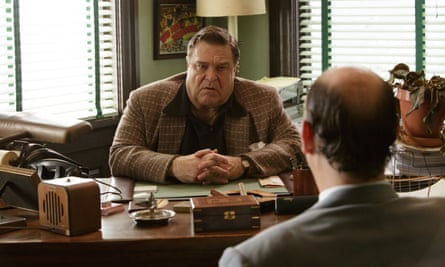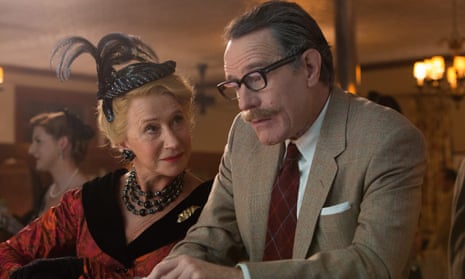The collision of American entertainment and anti-communism in the 1940s and 50s has inspired a dizzying array of movies, both fictional and factual. Time and again, Hollywood has returned to a subject that offers a heady cocktail of drama, politics and nostalgic showbusiness intrigue; from Irwin Winkler’s Guilty By Suspicion (1991), which cast Robert De Niro as a film-maker torn between losing work and naming names, to George Clooney’s Good Night, and Good Luck (2005), which revisited TV journalist Edward R Murrow’s on-air battles with McCarthy, via Frank Darabont’s whimsical The Majestic (2001), in which Jim Carrey’s amnesiac screenwriter winds up restoring a small-town cinema after being hounded out of Tinseltown as an anti-war “red”.
Top of the pile, however, is Martin Ritt’s 1976 gem The Front, which starred Woody Allen as a schlub whose name provides a disguise for blacklisted writers, and who gains an uncharacteristically heroic backbone when he tells a House Un-American Activities Committee (HUAC) hearing: “Fellas, I don’t recognise the rights of this committee to ask me these kind of questions and, furthermore, you can all go fuck yourselves.”
Austin Powers director Jay Roach’s film about the blacklisted writer Dalton Trumbo – one of the “Hollywood 10” – who wrote Roman Holiday without credit after serving time in jail for defying the HUAC, shares its title with Peter Askin’s 2007 dramatic documentary. Rooted in a 2003 off-Broadway stage production by Christopher Trumbo based on his father’s letters, Askin’s film included David Strathairn (star of Good Night, and Good Luck) reciting Trumbo’s 1970 speech to the Writers Guild of America in which he declared “that the blacklist was a time of evil and that no one on either side who survived it came through untouched by evil”.
A version of that same speech appears in Roach’s somewhat fictionalised movie (written by John McNamara from Bruce Cook’s biography), here brought to life by Oscar nominee Bryan Cranston. He’s terrific in the role, perfectly embodying the irascible genius of a writer who did his best work in the bath (where we first meet him, pen in one hand, cigarette holder in the other), and whose stubbornness was a source of both strength and weakness.
We open in 1947, with Trumbo the highly prized and paid writer of hits such as Kitty Foyle, Tender Comrade and A Guy Named Joe. From here, Cranston encapsulates Trumbo’s changing fortunes with enough wit, charm and insight to ensure that he remains a fully rounded character even when the tragicomic drama around him drifts towards the two-dimensional. Whether he’s pounding the typewriter to a jazzy score, finding his feet in a federal penitentiary or pseudonymously churning out B-pictures for King Brothers Productions (Trumbo famously worked on films such as Gun Crazy and Carnival Story for the company), Cranston conveys that most complex conundrum – the industrial artistic process.
Around him are a gaggle of supporting players – some “real”, some confusingly composite (notably Louis CK’s Arlen Hird) – who variously support or suffer under the anti-communist regime. Michael Stuhlbarg, David James Elliott and Dean O’Gorman do passable impersonations of Edward G Robinson, John Wayne and Kirk Douglas respectively, while Helen Mirren is a symphony of mad hats and madder stares as a Cruella De Vil-ish Hedda Hopper.

But the show is stolen by John Goodman as the baseball bat-wielding Frank King, a prolific producer who has invested in a gorilla suit and needs somebody to write a prison picture involving women fighting in their underwear. You can almost hear Goodman’s Barton Fink co-star Tony Shalhoub screaming the immortal lines: “It’s a goddam B-picture! Big men in tights! You know the drill!”
Alongside flagging up Otto Preminger’s unsung role in returning Trumbo’s name to the screen, what gives Roach’s movie bite is the depiction of the writer’s family and the toll that his actions and allegiances take upon them. Diane Lane is excellent as Trumbo’s loving but long-suffering spouse, Cleo, defending her children against their father’s drug- and alcohol-fuelled irritability, and Elle Fanning works wonders with the role of Niki (played in her younger years by Madison Wolfe), the elder daughter who seems to embody so many of her father’s fiery, idealistic traits. In the end, it is through the eyes of these characters that we see Trumbo most clearly, in all his stubborn, satirical glory. Cranston’s Trumbo may be the focus of attention, but Lane and Fanning’s Cleo and Niki (along with the rest of his family) are the power behind his throne – in fiction as in life.

Comments (…)
Sign in or create your Guardian account to join the discussion